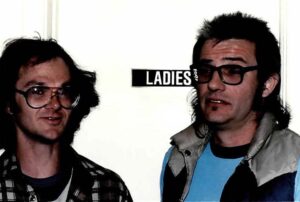#41 THE POETRY OF DENNIS FORMENTO: A Little Corner of the Unknown Universe

Spirit Vessels by Dennis Formento
Melodious Funk
writing a language nobody cares about
much less speaks
in a little corner of the unknown universe
we cling to it
we’re proud of it
we even think there’s some reason to preserve it
& so we keep on writing
as if somebody’s going to read it
hello out there
As I’m one of those fairly rare birds with two degrees from poetry school (yeah, that’s a thing), I’m not just aware of the plight of poets in this era, I’m living it. I’m not only a brother-in-arms with Dennis Formento, we attended the same poetry school (Naropa) in the 80’s, the same classes and parties, and that sent us off into this rather lonely and poorly recompensed occupation.
As New York poet Alex Dimitrov observed, even in poetry jobs they don’t want to pay you to write poems.
And yet, if you love poems, you’ll write them for free in “a language nobody cares about/ much less speaks” (William Faulkner Lives & Dies in Camelot, chapbook, 1995). That’s in turns despairing, realistic, and not entirely true, which makes it poetry, or that voice that has to speak from “a little corner of the unknown universe” to be heard—at least by itself. I can hear it. Hello, back.
Yet even that bleak sense of the poet’s avocation, effaced in Marshall McLuhan’s post-literate world now quite drowning in social media, comes with a joyful sense of finding your song, even just in the way the title, “Melodious Funk,” puns on “Thelonious Monk.”

Poets Dennis Formento & Andy Claussen, Boulder 1985
Naropa’s pedigree comes through the Beats, who loved and absorbed jazz, and this makes a nice literary lineage for Dennis’s home ground of New Orleans, and music that runs like a fabric through the city runs through his poems as well. From Looking for an Out Place (FootHills Publishing, 2010), “For Dave Cappello”:
Sweet or solid? I’m speechless.
He doesn’t play time, he plays
rings around time
accents & fills around
so you can always hear the beat
implied
The time
is never lost. All real thought
begins in speechlessness
all real world experience
begins in silence
You can go from the unheard to the expressed, or from the expressed to the unheard. That’s a metaphysics of art right there, one that knows when its alive and lived, cognizant of the formless mystery of its origins, in poetry, jazz, or living.
And while it’s the New Orleans environ that makes for the rich locale of much of his poetry, it’s where Dennis was unavoidably located when Hurricane Katrina landed its unholy Category 5 monstrosity there, and it’s left its mark on his poems ever since. It appears at the beginning of Looking for an Out Place, “first word”:
While waiting “to be seen”
in the unemployment office
taken temporary shelter
in this small town church
a woman tells another she was
in Los Angeles, visualizing relatives
her in-laws, I think
when a phone call home
brought the news: “We’re
all leaving town.” “Why?” she replied.
“Why?
Because of Katrina.”
“Katrina who.”
Later in the book, his emotional/political reaction to both the devastation and the government’s inept, racist “emergency response” gets condensed concisely into a few poetic apoplectic lines:
pump fire, flood,
famine, blood
into our houses,
wail from our roofs
and get shafted
my whole head is dilating
o eye of eyes
Sometimes the mind (the “eye of eyes”) struggles to be commensurate to the task of sight. And it is that task of greater sight that does fall to the poet. On the other side of Katrina, as it finds some way to recede from the environment and the mind, Dennis starts his next book (Spirit Vessels, FootHills Publishing, 2018) with the title poem:
Spirit vessels,
we walk on water, fire and oil
we walk on the via del vento
To rid yourself of poison, grow—
get your hands in dirt and know
that we can build up something new in the soiled
wreckage of the old
a mockingbird just got my first blackberry of summer
It’s not only urban renewal but the spiritual restoration of the human to nature, the purification of trauma from the earthly and the human. And this, too, is the poet’s job to enact. To live sensitively within your time and express back to it what it needs to hear. Ezra Pound called artists the “antennae of the race,” as they must process what most people feel only vaguely, if at all. If you’re doing your job right, one place it can lead is moral succinctness. Here, in “ghost species II” (Phaeton’s Wheels, unpublished ms.), he sums up our malaise in a few short lines:
evil is no external force
it’s a weakness inside each of us
gaining power through
failure of acceptance
acceptance of failure
recast as virtue
Seeing evil as an “external force” is a “failure of acceptance”–of other people and the world you occupy. That genuine evil gets committed and covered over by ordinary humans while we scan the landscape for super-villains becomes just another way we fail to see it in ourselves.
You have to be in tune with the subtleties and come away with something recognizable as clarity (whatever that might mean). It could mean you’re a romantic who loves his wife the way Dennis does in a number of poems, and that, too, might be slippery to explain. “Early wake up poem (for Patricia)” from Phaeton’s Wheels:
I woke with that exotic feeling
of having been somewhere
I couldn’t remember
where the rules of reality
are different
a sound like
a rumble and thunder
that could be a truck
could be the earth moving
under our skin
and you and I
we made it happen
I’m only glossing a bit of Dennis Formento’s work here, having the satisfaction of seeing someone else from my cadre mature in his craft, and getting to tell you a little about that. It’s surprising, though maybe it shouldn’t be, what you can uncover about the unknown universe in the little corner you occupy, but it’s something you can see with a big enough lens.

Dennis Formento


Yes, I’d say this is too refined and obscure for me Gary, but I enjoyed seeing an old photo of Dennis and Andy Claussen (whose daughter, Mona, went to September School during my years there.)